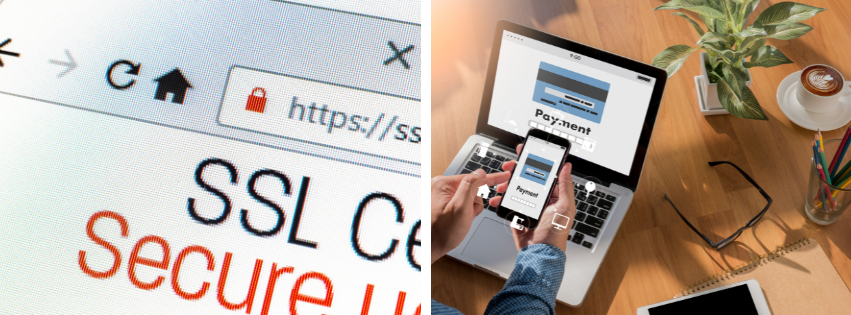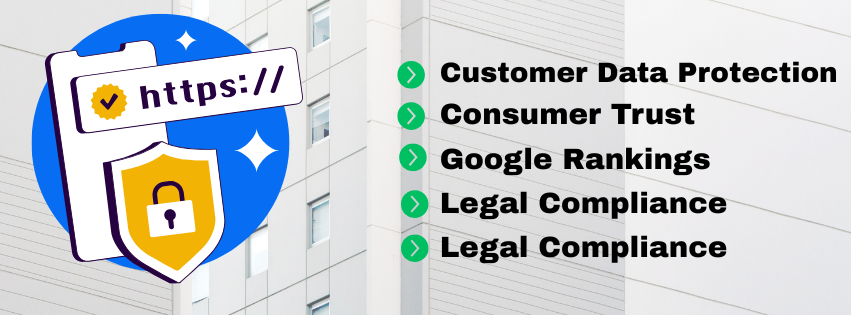Secure online payments have become the backbone of Philippine e-commerce success. But here’s what many Filipino online store owners don’t realize, without proper SSL protection, you’re literally handing cybercriminals the keys to your customers’ wallets.
Ready to protect your Philippine online store? Get Truehost SSL certificates and secure your customers’ trust today.
The numbers don’t lie. Philippine e-commerce sales jumped 25% in 2024, yet over 60% of local online shoppers still abandon their carts due to security concerns. That hesitation costs you money every single day.
You know what’s really happening here? Your potential customers see that missing padlock icon. They notice the HTTP instead of HTTPS. And they click away, straight to your competitor’s secure site.
Why SSL Certificates Are Non-Negotiable for Philippine Online Stores
Let’s get one thing straight. SSL isn’t just some fancy tech buzzword anymore. It’s the difference between thriving and barely surviving in today’s Philippine digital marketplace.

What Exactly Is SSL?
SSL stands for Secure Sockets Layer. Think of it as an invisible bodyguard for your website. Every time someone enters their credit card details or personal information, SSL scrambles that data into unreadable code.
Here’s how it works: when Maria from Makati types her card number on your site, SSL transforms those digits into gibberish. Only your payment processor can decode it back. Pretty neat, right?
The visual proof is simple. You get that green padlock in the address bar. Your URL changes from HTTP to HTTPS. Filipino customers recognize these trust signals immediately.
The Philippine E-Commerce Reality Check
Philippine online retail is exploding. The Department of Trade and Industry reports that local e-commerce grew by 87% in recent years. But growth brings challenges.
Filipino consumers are naturally cautious about secure online payments. Cultural factors play a huge role here. Trust takes time to build in our market.
The Bangko Sentral ng Pilipinas has also tightened cybersecurity requirements. Compliance isn’t optional anymore, it’s mandatory for anyone processing secure online payments.
Five Game-Changing Reasons Philippine E-Tailers Need SSL

You might think SSL is expensive or complicated. Honestly, the cost of NOT having it is way higher. Let me break down exactly why.
1. Customer Data Protection That Actually Works
Your customers’ personal information is gold to hackers. Credit card numbers, addresses, phone numbers, all of it.
Without SSL, this data travels across the internet like postcards. Anyone can read it. With SSL, it’s like sending everything in a locked titanium box.
PCI DSS compliance requires SSL for secure online payments. Miss this requirement, and you face hefty fines plus legal headaches.
2. Filipino Consumer Trust (The Real Deal)
Here’s something interesting about Philippine shoppers. They’re incredibly brand-loyal once you earn their trust. But they’re also quick to share bad experiences.
SSL certificates show that green padlock icon. Filipino customers look for this before entering payment details. No padlock? No sale.
Social media amplifies everything in the Philippines. One security scare, and your reputation spreads across Facebook faster than you can say “damage control.”
3. Google Rankings That Actually Matter
Google confirmed it years ago, SSL is a ranking factor. But here’s what most Philippine businesses miss: mobile search rankings weight security even more heavily.
Since 78% of Philippine internet users browse on mobile, this matters big time. Your SSL certificate directly impacts how Google shows your store in search results.
Page loading speed also improves with modern SSL certificates. Faster sites rank higher. It’s that simple.
4. Legal Compliance Made Simple
The Data Privacy Act of 2012 requires proper security measures for personal information. SSL counts as a technical safeguard under this law.
BSP Circular No. 808 specifically addresses secure online payments for financial transactions. Non-compliance can mean business closure.
Legal fees and regulatory fines cost way more than SSL certificates. Do the math.
5. Competitive Edge in a Crowded Market
Philippine e-commerce is getting crowded fast. Shopee, Lazada, and local players are all fighting for the same customers.
Professional SSL certificates make your small store look as trustworthy as the big guys. That’s powerful positioning.
Customer retention improves dramatically when people feel secure making purchases. Repeat customers spend 67% more than new ones.
Choosing the Right SSL Certificate for Your Philippine Store
Not all SSL certificates work the same way. Your business size and needs determine which type fits best.
Domain Validated (DV) SSL Certificates
Perfect for small Philippine online stores just starting out. These validate that you own your domain name.
Best for:
-
New e-commerce sites
-
Limited budgets
-
Basic secure online payments
Validation takes minutes, not days. You can get protected today without lengthy paperwork.
Cost ranges from ₱2,000-₱8,000 annually. That’s less than what most stores spend on social media ads monthly.
Organization Validated (OV) SSL Certificates
Established Philippine businesses should consider OV certificates. These verify your company exists and operates legally.
The certificate displays your business name in the details. This builds additional trust with security-conscious Filipino customers.
Validation requires business documents. Expect 1-3 days processing time. But the credibility boost is worth waiting for.
Extended Validation (EV) SSL Certificates
Large retailers and payment processors need EV certificates. These trigger the green address bar in older browsers.
The validation process is extensive. Certificate authorities verify your business thoroughly. This can take 1-2 weeks.
Investment ranges from ₱15,000-₱50,000 annually. Only consider this if you process significant transaction volumes.
Multi-Domain and Wildcard Options
Growing Philippine businesses often need protection across multiple subdomains. Wildcard certificates cover unlimited subdomains under one domain.
Multi-domain certificates protect completely different domain names. Useful if you operate several brand websites.
These specialized certificates cost more upfront but save money long-term. Calculate your needs carefully.
Setting Up SSL on Your Philippine E-Commerce Site
Implementation doesn’t have to be rocket science. Most Filipino web hosting providers offer SSL installation services.
Step-by-Step SSL Implementation
-
Choose your certificate type based on business needs. Start with DV if you’re unsure.
-
Purchase from a reputable Certificate Authority. Avoid free certificates for serious e-commerce operations.
-
Generate a Certificate Signing Request (CSR). Your hosting provider can handle this technical step.
-
Complete domain or business validation. Respond quickly to validation emails or calls.
-
Install the certificate on your server. Most Philippine hosting companies offer free installation.
-
Test everything thoroughly. Don’t assume it’s working until you verify.
Common Implementation Mistakes
Mixed content errors kill SSL effectiveness. All images, scripts, and links must use HTTPS.
Redirect loops confuse search engines and customers. Set up proper 301 redirects from HTTP to HTTPS.
Certificate chain issues cause browser warnings. Ensure your hosting provider installs intermediate certificates correctly.
Testing Your SSL Implementation
Use online tools like SSL Labs’ SSL Test to verify your setup. Aim for an A+ grade.
Check all pages, not just your homepage. Payment pages, login forms, and customer accounts need special attention.
Monitor certificate expiration dates. Set calendar reminders for renewal 30 days early.
Need professional SSL installation? Truehost Philippines offers expert SSL setup services with 24/7 local support.
SSL Best Practices for Philippine Online Retailers
Getting SSL right the first time saves headaches later. Here’s what works for successful Philippine e-commerce sites.
Choosing a Trusted Certificate Authority
Stick with globally recognized Certificate Authorities. Comodo, DigiCert, and GlobalSign work well for Philippine businesses.
Browser compatibility matters enormously. Older browsers used by some Filipino customers need broad CA support.
Local support helps when problems arise. Choose CAs with Philippine-based technical support teams.
Certificate Management and Renewal
Set up automatic renewals whenever possible. Manual renewal leads to expired certificates and lost sales.
Monitor certificates across all your domains and subdomains. Use tools like SSL monitoring services for alerts.
Keep backup certificates ready. Certificate problems always happen at the worst possible times.
Your SSL Action Plan for Philippine E-Commerce Success
Security isn’t something you can postpone indefinitely. Every day without SSL protection puts your business at risk.
Filipino customers are becoming more security-conscious. Social media educates them about online threats daily. They expect protection.
Your competitors are already implementing SSL certificates. Don’t let them gain the trust advantage while you hesitate.
The investment pays for itself quickly. Improved conversion rates, better search rankings, and customer retention generate real ROI.
Ready to secure your Philippine online store? Truehost SSL certificates provide complete protection with local support and competitive pricing.
Start with a Domain Validated certificate if you’re unsure. You can always upgrade later as your business grows.
But start today. Your customers’ trust – and your business success – depends on secure online payments protection you can provide.
 Web HostingCost-effective shared hosting solutions
Web HostingCost-effective shared hosting solutions Reseller HostingStart your own hosting business without tech hustle
Reseller HostingStart your own hosting business without tech hustle Affiliate ProgramEarn commission by referring customers to our platforms
Affiliate ProgramEarn commission by referring customers to our platforms cPanel HostingHosting powered by cPanel (Mostly user friendly)
cPanel HostingHosting powered by cPanel (Mostly user friendly) Windows HostingOptimized for windows based-applications and sites
Windows HostingOptimized for windows based-applications and sites Domain SearchFind and register available domain names in seconds
Domain SearchFind and register available domain names in seconds All DomainsExplore and register domain extensions across the world
All DomainsExplore and register domain extensions across the world Domain Transfermove your domain to us with zero downtime and full control
Domain Transfermove your domain to us with zero downtime and full control Whois LookupLook up domain ownership, expiry dates and registrar information
Whois LookupLook up domain ownership, expiry dates and registrar information .com DomainSecure the most recognized domain for global credibility
.com DomainSecure the most recognized domain for global credibility VPS HostingScalable virtual servers. Full root access. Faster speed.
VPS HostingScalable virtual servers. Full root access. Faster speed. Managed VPSNot a tech expert? Choose our fully managed VPS server.
Managed VPSNot a tech expert? Choose our fully managed VPS server. Dedicated ServersGet the full power and complete control of your own physical server.
Dedicated ServersGet the full power and complete control of your own physical server.
